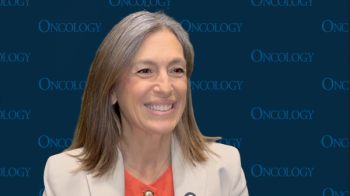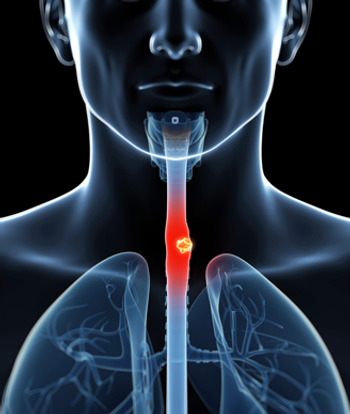
Oncology NEWS International
- Oncology NEWS International Vol 5 No 9
- Volume 5
- Issue 9
Multimodality Approaches Used in Esophageal Cancer
NIJMEGEN, The Netherlands--With 12,000 new cases of esophageal cancer diagnosed every year in the United States, and 5-year postoperative survival rates still hovering under 20%, the need to develop more effective multimodality treatment strategies remains crucial, said David Ilson, MD, of Memorial Sloan-Kettering Cancer Center.
NIJMEGEN, The Netherlands--With 12,000 new cases of esophagealcancer diagnosed every year in the United States, and 5-year postoperativesurvival rates still hovering under 20%, the need to develop moreeffective multimodality treatment strategies remains crucial,said David Ilson, MD, of Memorial Sloan-Kettering Cancer Center.
Of the three most extensively explored approaches--preoperativeradiotherapy, preoperative chemotherapy, and chemotherapy plusradiotherapy prior to or instead of surgery--preoperative radiotherapyhas had the least impact on survival, notwithstanding improvedlocal control, Dr. Ilson said in a presentation at the Sixth EORTCGastrointestinal Tract Cancer Cooperative Group symposium.
On the other hand, although preop-erative chemotherapy only rarelypro-duces pathologic complete responses, it has yielded clinicalresponse rates in the neighborhood of 50%, exerts no adverse influenceon surgery, and has been associated with a trend toward improvedsurvival, he said.
Still more promising may be intensified approaches that combinechemotherapy and radiotherapy, Dr. Ilson said. Surveying phaseII trials of 5-fluorouracil (5-FU)- or mitomycin (Mutamycin)-basedregimens coupled with radiation doses of 3,000 to 6,000 cGy, hepointed to pathologic response rates as high as 20% to 30% andto 5-year disease-free survival rates reaching 35% to 40% in somestudies.
Unfortunately, he said, preliminary results from a small Universityof Michigan trial have shown no differences in survival betweensurgery alone vs presur-gical 5-FU, cisplatin (Platinol), andvinblastine plus 4,500 cGy of radiation. Similarly, in an EORTCtrial, the combined modality approach appeared to offer no survivaladvantage over surgery alone.
"Although the pilot studies of preop-erative chemotherapy,with or without radiation, are very encouraging in terms of responseand trends in survival," he said, "these approachesremain investigational and need to be validated in the contextof controlled phase III studies."
In the nonsurgical setting, he said, chemotherapy and radiationare the definitive treatment, "and we can conclude that theyare superior to radiation alone."
Current studies are looking at increasing the duration and numberof cycles of chemotherapy and, in the nonoperative setting, escalatingthe radiation dose in an effort to improve local disease control."Obviously, the most important aspect of these studies isto try to identify the best chemotherapy, both to treat systemicdisease and to act as a radiosensi-tizer," Dr. Ilson said.
He noted that the CALBG group will shortly be initiating a phaseIII trial comparing surgery alone with two neoad-juvant and adjuvantregimens: (1) preop-erative cisplatin and 5-FU for one cycle,followed by two more cycles of chemotherapy with a concurrent4,500 cGy dose of radiation, and ending with three cycles of chemotherapyafter surgery or (2) three cycles of preoperative chemotherapyand two cycles of postoperative chemotherapy without radiation.
Role of Paclitaxel
At Memorial Sloan-Kettering, Dr. Ilson and his colleagues havebeen focusing on the possible role of paclitaxel (Taxol) in thetreatment of metastatic esophageal cancer. In a recently completedstudy combining paclitaxel, 175 mg/m² as a 3-hour infusion,with 5-FU and cisplatin, they achieved overall response ratesof 46% for adenocarcinoma and 50% for squamous cell carcinoma.
"What was most remarkable about this study was the very highrate of clinical complete responses in metastatic squamous cellcancer," Dr. Ilson said. "Nearly half the responseswe saw were clinical complete responses." He acknowledged,however, that "the high response rate in this study was atthe cost of significant toxicity." Significant myelosuppressionoccurred in 41% of patients and worrisome neuropathy in 20%.
The Memorial team is currently conducting a phase II trial ofpaclitaxel, 200 mg/m2, plus cisplatin both in metastatic diseaseand as a preoperative induction regimen. They are also assessingthe use of paclitaxel as a radiosensitizer in the phase I setting.
For the future, Dr. Ilson projects that the Memorial group willbe evaluating the clinical potential of irinotecan, vinorelbine(Navelbine), and lobaplatin in esophageal cancer.
Articles in this issue
over 29 years ago
Talking With Your Doctor About Cancer and Its Therapyover 29 years ago
Guttman Institute Reopens With Expanded Screening Servicesover 29 years ago
Weight Gain, Not Fat Intake, Increases Breast Cancer Riskover 29 years ago
Knowing When to Bow Out Gracefullyover 29 years ago
Chemo Appears Not To Raise Birth Defect Risk in Offspringover 29 years ago
Discovery of HIV-1 Protein Structure Could Lead to New Therapiesover 29 years ago
'Friends of Cancer Research' Will Lead New Public Education Campaignover 29 years ago
Cost of the New HIV Therapies Creates a Doctor's DilemmaNewsletter
Stay up to date on recent advances in the multidisciplinary approach to cancer.





































